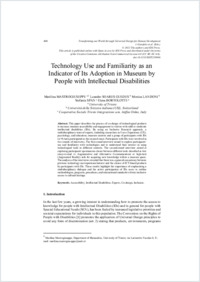Technology use and familiarity as an indicator of its adoption in museum by people with intellectual disabilities
- Mastrogiuseppe, Marilina Department of Humanities, University of Trieste, Italy
- Soares Guedes, Leandro ORCID Istituto Dalle Molle di studi sull'intelligenza artificiale (IDSIA), Facoltà di scienze informatiche, Università della Svizzera italiana, Svizzera
- Landoni, Monica ORCID Istituto Dalle Molle di studi sull'intelligenza artificiale (IDSIA), Facoltà di scienze informatiche, Università della Svizzera italiana, Svizzera
- Span, Stefania Cooperativa Sociale Trieste Integrazione a.m. Anffas Onlus, Italy
- Bortolotti, Elena Department of Humanities, University of Trieste, Italy
- 2022
Published in:
- Transforming our World through Universal Design for Human Development - Proceedings of the Sixth International Conference on Universal Design. - 2022, p. 400-407
English
This paper describes the process of co-design of technological products to increase museum accessibility and engagement in visitors with mild or moderate intellectual disabilities (IDs). By using an Inclusive Research approach, a multidisciplinary team of experts, including researchers in Users Experience (UX), psychology, and education, museum curators and a group of participants with IDs (n=9) have participated as the research team. Participants with IDs were involved in two rounds of interviews. The first-round interview aimed to explore participants’ use and familiarity with technologies and to understand their interest in using technological tools in different contexts. The second-round interview aimed at exploring participants’ spontaneous choice between different tools classified as low (easy-to-read vs Augmentative and Alternative Communication) or high-tech (Augmented Reality) aids for acquiring new knowledge within a museum space. The analysis of the interviews revealed that there was a general consistency between previous technology use/experience/interest and the choice of ICT-based products by participants with IDs. These results highlight the importance of emphasizing a multidisciplinary dialogue and the active participation of IDs users to outline methodologies, programs, procedures, and international standards to foster inclusive access to cultural heritage.
- Collections
- Language
-
- English
- Classification
- Computer science and technology
- License
- Open access status
- green
- Identifiers
-
- DOI 10.3233/SHTI220866
- ARK ark:/12658/srd1328167
- Persistent URL
- https://n2t.net/ark:/12658/srd1328167
Statistics
Document views: 94
File downloads:
- Soares Guedes_2022_UD2022: 88
